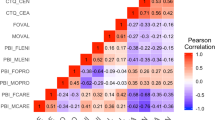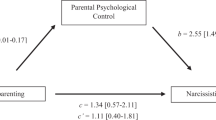Abstract
The present study examined the relation between adolescent and parent reports of parenting practices and adolescent grandiose and vulnerable narcissism. Participants were 300 adolescents (257 males, 43 females) who were enrolled in a short-term residential program. Findings linked grandiose narcissism to adolescent reports of positive parenting practices and poor monitoring and supervision. Vulnerable narcissism was significantly positively correlated with inconsistent discipline and poor monitoring and supervision with inconsistent discipline predicting unique variance in adolescent vulnerable narcissism. The hypothesized interaction between positive reinforcement and poor monitoring and supervision in predicting grandiose narcissism was not supported. The implications of these findings as well as limitations and directions for further research on parenting and adolescent narcissism are discussed.
Similar content being viewed by others
References
Barry, C. T., & Wallace, M. T. (2010). Current considerations in the assessment of youth narcissism: Indicators of pathological and normative development. Journal of Psychopathology and Behavioral Assessment, 32, 479–489. doi:10.1007/s10862-010-9188-3.
Barry, C. T., Grafeman, S. J., Adler, K. K., & Pickard, J. D. (2007a). The relations among narcissism, self-esteem, and delinquency in a sample of at-risk adolescents. Journal of Adolescence, 30, 933–942. doi:10.1016/j.adolescence.2006.12.003.
Barry, C. T., Frick, P. J., Adler, K. K., & Grafeman, S. J. (2007b). The predictive utility of narcissism among children and adolescents: Evidence for a distinction between adaptive and maladaptive narcissism. Journal of Child and Family Studies, 16, 508–521.
Barry, C. T., Frick, P. J., & Grafeman, S. J. (2008). Child versus parent reports of parenting practices: Implications for the conceptualization of child behavioral and emotional problems. Assessment, 15, 294–303. doi:10.1177/1073191107312212.
Baumrind, D. (1971). Current patterns in parental authority. Developmental Psychology, 4, 101–103. doi:10.1037/h0030372.
Capron, E. W. (2004). Types of pampering and the narcissistic personality trait. Journal of Individual Psychology, 60, 76–93.
Cramer, P. (2011). Young adult narcissism: A 20 year longitudinal study of the contribution of parenting styles, preschool precursors of narcissism, and denial. Journal of Research in Personality, 45, 19–28. doi:10.1016/j.jrp.2010.11.004.
Fite, P. J., Greening, L., & Stoppelbein, L. (2008). Relation between parenting stress and psychopathic traits among children. Behavioral Sciences and the Law, 26, 239–248. doi:10.1002/bsl.803.
Frick, P. J., Christian, R. E., & Wooton, J. M. (1999). Age trends in association between parenting practices and conduct problems. Behavior Modification, 23, 106–128. doi:10.1177/0145445599231005.
Greenberger, E., Lessard, J., Chen, C., & Farruggia, S. P. (2008). Self-entitled college students: Contributions of personality, parenting, and motivational factors. Journal of Youth and Adolescence, 37, 1193–1204. doi:10.1007/s10964-008-9284-9.
Hawes, D. J., & Dadds, M. R. (2006). Assessing parenting practices through parent report and direct observation during parent-training. Journal of Child and Family Studies, 15, 554–567. doi:10.1007/s10826-006-9029-x.
Horton, R. S. (2011). On environmental sources of child narcissism: Are parents really to blame? In C. T. Barry, P. K. Kerig, K. K. Stellwagen, & T. D. Barry (Eds.), Narcissism and Machiavellianism in youth: Implications for the development of adaptive and maladaptive behavior (pp. 125–143). Washington, DC: American Psychological Association.
Horton, R. S., Bleau, G., & Drwecki, B. (2006). Parenting narcissus: What are the links between parenting and narcissism? Journal of Personality, 74, 345–376. doi:10.1111/j.1467-6494.2005.00378.x.
Kernberg, O. F. (1975). Borderline conditions and pathological narcissism. New York: Jason Aronson.
Klahr, A. M., & Burt, A. S. (2014). Elucidating the etiology of individual differences in parenting: A meta-analysis of behavioral genetic research. Psychological Bulletin, 140, 544–586.
Kohut, H. (1971). The analysis of the self: A systematic approach to the psychoanalytic treatment of narcissistic personality disorders. New York: International Universities Press.
Kohut, H. (1977). The restoration of the self. Madison, CT: International Universities Press.
Maxwell, K., Donnellan, M. B., Hopwood, C. J., & Ackerman, R. A. (2011). The two faces of Narcissus? An empirical comparison of the Narcissistic Personality Inventory and the Pathological Narcissism Inventory. Personality and Individual Differences, 50, 577–582.
Millon, T. (1981). Disorders of personality: DSM-III, Axis II. New York: Wiley.
Otway, L. J., & Vignoles, V. L. (2006). Narcissism and childhood recollections: A quantitative test of psychoanalytic predictions. Personality and Social Psychology Bulletin, 32, 104–116. doi:10.1177/0146167205279907.
Pincus, A. L., Ansell, E. B., Pimentel, C. A., Cain, N. M., Wright, A. C., & Levy, K. N. (2009). Initial construction and validation of the Pathological Narcissism Inventory. Psychological Assessment, 21, 365–379. doi:10.1037/a0016530.
Schulenberg, J. E., Sameroff, A. J., & Cicchetti, D. (2004). The transition to adulthood as a critical juncture in the course of psychopathology and mental health. Development and Psychopathology, 16, 799–806. doi:10.1017/S0954579404040015.
Shelton, K. K., Frick, P. J., & Wootton, J. (1996). The assessment of parenting practices in families of elementary school-aged children. Journal of Clinical Child Psychology, 25, 317–327. doi:10.1177/0145445599231005.
Thomaes, S., Bushman, B. J., de Castro, B., & Stegge, H. (2009). What makes narcissists bloom? A framework for research on the etiology and development of narcissism. Development and Psychopathology, 21, 1233–1247. doi:10.1017/S0954579409990137.
Trumpeter, N. N., Watson, P. J., O’Leary, B. J., & Weathington, B. L. (2008). Self-functioning and perceived parenting: Relations of parental empathy and love inconsistency with narcissism, depression, and self-esteem. The Journal of Genetic Psychology: Research and Theory on Human Development, 169, 51–71. doi:10.3200/GNTP.169.1.51-71.
Watson, P. J., Little, T., & Biderman, M. D. (1992). Narcissism and parenting styles. Psychoanalytic Psychology, 9, 231–244. doi:10.1037/h0079344.
Wright, A. C., Lukowitsky, M. R., Pincus, A. L., & Conroy, D. E. (2010). The higher order factor structure and gender invariance of the Pathological Narcissism Inventory. Assessment, 17, 467–483. doi:10.1177/1073191110373227.
Author information
Authors and Affiliations
Corresponding author
Rights and permissions
About this article
Cite this article
Mechanic, K.L., Barry, C.T. Adolescent Grandiose and Vulnerable Narcissism: Associations with Perceived Parenting Practices. J Child Fam Stud 24, 1510–1518 (2015). https://doi.org/10.1007/s10826-014-9956-x
Published:
Issue Date:
DOI: https://doi.org/10.1007/s10826-014-9956-x




